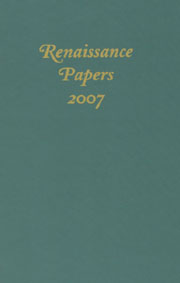Book contents
- Frontmatter
- Contents
- Renaissance Papers
- John Donne and the Practice of Priesthood
- Charity, Halifax, and Utopia: The Disadvantageous Setting of Thomas Browne's Religio Medici
- Presbyterian Church and State Before The Solemn League and Covenant
- The Flaw in Paradise: The Critique of Idealism in Margaret Cavendish's The Blazing World
- “Conceited portraiture before his Book … to catch fools and silly gazers”: Some Reflections on Paradise Lost and the Tradition of the Engraved Frontispiece
- “But Smythes Must Speake”: Women's and Commoners' Voices in the Mirror for Magistrates
- Fit for a King: The Manuscript Psalms of King James VI/I
- The Suicide of Lavinia: Finding Rome in Titus Andronicus
- The Language of Gods: Rhetoric and the Construction of Masculinity in Julius Caesar
“But Smythes Must Speake”: Women's and Commoners' Voices in the Mirror for Magistrates
Published online by Cambridge University Press: 12 September 2012
- Frontmatter
- Contents
- Renaissance Papers
- John Donne and the Practice of Priesthood
- Charity, Halifax, and Utopia: The Disadvantageous Setting of Thomas Browne's Religio Medici
- Presbyterian Church and State Before The Solemn League and Covenant
- The Flaw in Paradise: The Critique of Idealism in Margaret Cavendish's The Blazing World
- “Conceited portraiture before his Book … to catch fools and silly gazers”: Some Reflections on Paradise Lost and the Tradition of the Engraved Frontispiece
- “But Smythes Must Speake”: Women's and Commoners' Voices in the Mirror for Magistrates
- Fit for a King: The Manuscript Psalms of King James VI/I
- The Suicide of Lavinia: Finding Rome in Titus Andronicus
- The Language of Gods: Rhetoric and the Construction of Masculinity in Julius Caesar
Summary
WILLIAM Baldwin's dedication to A Mirror for Magistrates, addressed “to the nobilitye and all other in office,” describes the tragedies that are to follow as a “loking glas” for those charged with the responsibilities of justice and government (p. 65). Baldwin thus posits a narrow audience of privileged male readers, and promises that the text will reflect these readers' experiences. But, as Jessica Winston argues, successive editions of the work reached an increasingly broad and varied audience, and the Mirror likewise depicted a remarkable variety of people as actors on the historical stage; the new tragedies of the 1563 edition, in particular, “widened the scope of subjects and citizens who were capable of serving as mirrors for magistrates.” The collaborative and polyvocal nature of the text allowed a range of voices and perspectives to be heard, including those of women and commoners. The prose links in the Mirror contain a great deal of discussion and debate about how to depict these speakers, suggesting that this was a topic of some concern for the authors.
The Mirror begins, as it happens, by denying a commoner a voice within the text because of his social station: “And therefore omytting the ruffle made by Iacke Strawe and his meyny, and the mourder of many notable men which thereby happened, for Iacke (as ye knowe) was but a poore prince: I will begin with a notable example which within a whyle after ensued” (p. 71).
- Type
- Chapter
- Information
- Renaissance Papers 2007 , pp. 83 - 96Publisher: Boydell & BrewerPrint publication year: 2008



